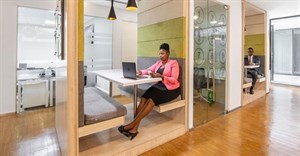Subscribe & Follow
Trending

 Woolworths sees over 20% drop in annual earningsAby Jose Koilparambil
Woolworths sees over 20% drop in annual earningsAby Jose Koilparambil



Think before you fly

There certainly was a time - around when the term "jet set" was coined in the late 1950s - when flying in a large passenger aeroplane was just about the smartest thing you could do. The fact that you could get from A to B in a few hours was a technological breakthrough, an achievement in itself. Nowadays, it's so much a part of everyday business life that we can hardly bear another conversation about airport security, the iniquities of budget airlines or the dangers of deep-vein thrombosis.
There is another consideration, too - the environment. We know that jet planes burn precious fuel and deplete the ozone layer in the process. Clearly, we shouldn't fly if there is a practical alternative. However, we also know that global businesses depend on people and cargoes being flown across countries, continents and oceans on a daily basis. The challenge today is not whether we can get somewhere, but whether we really need to fly, and if we do, how effectively we can use the time we spend on the move.
It's the only way to go - if you're in a hurry
The first thing that strikes me is that very different considerations apply to long-haul versus short-haul air travel. With long-haul, there is simply no alternative to air travel.
Aircraft may look very different in 50 years, and may even run on a different kind of fuel, but there is no way that sea-going vessels, however fast or comfortable, are ever going to be suitable for business trips across the Pacific; nor are high-speed railways going to be viable across many of the world's great wildernesses or mountain ranges.
With long-haul travel, the expense and time commitment make it that much more unlikely that you would make the trip if you didn't have to. However, once you have decided to fly, you can make your time so much more productive these days. Queuing and security take up proportionately less of your travelling time than on short trips. Customer service is of an entirely different order. A long flight is actually a precious opportunity to do some reading, or settle down with your laptop, without interruptions, and work through ideas and strategies.
WiFi on planes may soon become the norm, but in the meantime you can use the business lounges or Regus business centres at either end of your journey to reconnect electronically, and may even feel refreshed by your period offline. You know that it's your time, and how you use it is up to you.
'If it's Tuesday I must be in Belgium'
Short-haul trips are a completely different matter. From the traveller's point of view, they have a debilitating effect on the psyche. There's nothing more annoying, for instance, than being required to make one-day or two-day trips between European capitals. In other circumstances, the offer of a return flight to Prague, Rome or Stockholm ought to hold some allure. These are interesting places to go. However, the reality of travelling on business is that you barely register the change of country.
As a typical short-haul business traveller, you spend your day and a half mooching, sheep-like, through airports, hopping into cabs or onto tube trains and meeting business contacts in offices or conference centres which are much the same anywhere in the world. You hardly spend long enough in any one place to do any useful work. You can pay by credit card and never meet any local people. You gain no mental or cultural stimulation from travelling those hundreds of miles. You hardly have time to see whether the sun is shining. This kind of travel is wasteful, disorienting, and bad for the soul. Most of all, it is frequently unnecessary.
Fewer may be better
Let's take an example - a quarterly sales and marketing meeting, or something with similar strategic significance. It's important, and you need to get input from the right people. But do they all have to be in the same room? Not really. Sometimes, you can ask people to submit ideas in advance. Moreover, when you have three or four people who work closely together, you don't need all of them. Let them take it in turns. They probably know each other well enough to brief the one attendee - and to debrief that person afterwards. The meeting itself may be more productive with six or seven people round the table instead of 20.
Then there's video communication, which I use more and more these days. I can stay in one place while taking part in a meeting in one city in the morning, another in the afternoon.
The main business of any given meeting can be conducted quite satisfactorily with several people connecting via video link.
Planning is the key. For some of us, a certain amount of short-haul air travel is unavoidable, but the more you plan these things in advance, the more you can get out of each trip. This is so whether it be catching up with two or three business contacts in one place, taking your spouse for a weekend away, or scheduling one meeting so as to make it a shorter journey to your next. As with other forms of travel - walking or cycling, for instance - a round trip is always more rewarding.
Time to leave the herd
Business has always been prone to a herd mentality. We see it in the suits business people wear, the jargon they spout, the PowerPoint presentations they give and the way that bull and bear markets behave. Business travel is no different. If one person is prepared to fly somewhere for a meeting, it seems we all have to - or risk being labelled lazy or uncommitted. Such is the prevailing wisdom, and it is high time we challenged it.
In recent decades, we have outgrown the habits of mass migration to factories or daily commutes to offices, with their oppressive rituals and outdated hierarchies. Why then do we risk our health, efficiency and peace of mind by submitting to the indignities and inconvenience of frequent short-haul travel?
Travel can broaden the mind, but only if we think before we book that flight.
Regus
Regus South Africa is the local subsidiary of Regus, one of the world's leading providers of flexible workspace solutions. Regus' South African footprint currently includes 12 local centres and 23 in the whole of Africa. For more information go to www.regus.co.za and www.regus.com.








